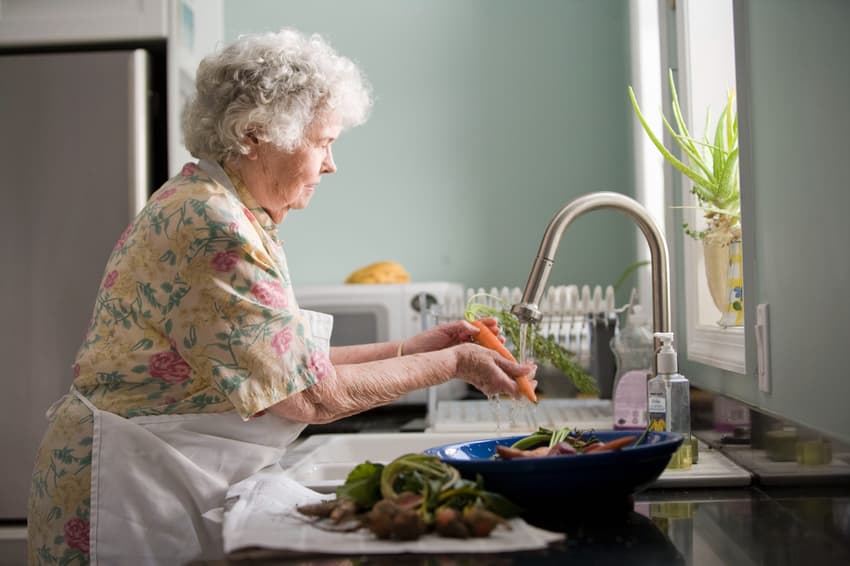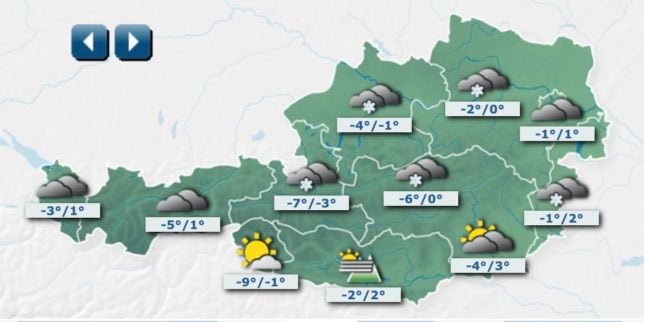Today in Austria: A roundup of the latest news on Friday

Lower Austrian elections, details on increased retirement age are announced, Austrians are having problems affording homes and more news from Austria on Friday.
- Lower Austria to elect new regional parliament
Austria's province Lower Austria is set to elect a new regional parliament this Sunday, the 29th. The most recent polls put the local ÖVP branch, the centre-right VPNÖ, in the lead with 37 percent of voting intentions. Next, the far-right FPÖ has 26 percent of the votes, a significant leap from their results in the last elections, when the blue party had 14.8 percent.
In third place, the centre-left SPÖ has 23 percent, while NEOS has 7 percent and Greens 6 percent.
NIEDERÖSTERREICH | Sonntagsfrage Landtagswahl OGM/Kurier
VPNÖ: 37% (-5)
FPÖ: 26% (+11)
SPÖ: 23% (+1)
NEOS: 7% (+1)
GRÜNE: 6% (-2)
Sonstige: 1% (-6)
Änderungen zur letzten Umfrage vom 08. Mai 2022
Verlauf: https://t.co/zCC0U1xvRv#ltwnoe pic.twitter.com/Qjbfe8XdTL
— Österreich Wählt (@Wahlen_AT) January 21, 2023
- EXPLAINED: What is the Austrian integration exam for non-EU nationals?
If you are a third-country citizen in Austria, you will likely have to show German skills and basic knowledge of the democratic system for a residence permit. Here's what you need to know about the Integration Exam.
- Austrian government announces details on increased retirement age for women
This week, Austria's government unveiled detailed plans for raising women's retirement age to match men's. Gradually and by 2033, women's retirement age will rise from 60 to 65.
The exact time timetable has been announced by the federal coalition and should be approved in the National Council next week, the newspaper Der Standard reported. Women born between January 1st and June 30th, 1964, will only be able to start their pension years once they reach 60.5 years old.
For those born in the second half of 1964, the standard retirement age will be 61. This continues rising until women who were born after 30 June 1968 have a retirement age of 65, as do their male colleagues.
READ ALSO: Five things you need to know about the Austrian pension
- Salzburg to get free kindergartens
Children from three to six years old will be able to attend state kindergartens for free in Salzburg starting April, broadcaster ORF reported. The costs of around €13 million will be subsidised entirely by the western state.
The parties couldn't reach an agreement to relieve the burden of childcare costs for children under the age of three, but the negotiations will continue.
- FPÖ outraged by 'anti-democratic' statements by Van der Bellen
Austria’s Federal President Alexander Van der Bellen recently said that he wouldn't automatically give FPÖ party leader Herbert Kickl the task of forming a government if the far-right party won the federal elections.
The statements have caused an uproar within the ranks of the FPÖ, the newspaper Die Presse reported. On Thursday, FPÖ secretary-general Christian Hafenecker said the comments were an "anti-democratic and authoritarian act."
On Facebook, Kickl criticised the "arbitrariness of an individual" and ironically commented: "Aha. Very neutral. Very democratic. Very moral. Very tolerant.".
READ ALSO: Can the Austrian president refuse to appoint a far-right chancellor?
- Funding for 24-hour care to be increased
The subsidy for 24-hour care at home for people in need of care will be increased retroactively as of January 1st, broadcaster ORF reported. The federal government is expanding the subsidies by 16.67 percent, the Ministry of Social Affairs announced on Thursday.
READ ALSO: Health care reform: Austria to give €2,000 bonus to nursing staff
- One in there people has problems affording housing
More and more people are having payment problems due to rising housing and energy costs, according to data from the Vienna Chamber of Labor (AK) and Volkshilfe Wien. Already 30 percent of 16- to 69-year-olds fear they will no longer be able to meet their housing costs, reported ORF.
AK expert Thomas Ritt said that financial aid is good and important but that the housing sector should be regulated, for example, by capping rents, which would provide immediate relief for tenants.
The experts also said other measures are needed, such as allowing only subsidised apartments to be built on federal properties. In addition, there would have to be an effective federal vacancy tax and a restriction on short-term rentals.
READ ALSO: What are Austria’s Social Democratic Party’s plans for freezing rents until 2025?
- Weather

Screenshot from ZAMG
If you have any questions about life in Austria, ideas for articles or news tips for The Local, please get in touch with us at [email protected].
Comments
See Also
- Lower Austria to elect new regional parliament
Austria's province Lower Austria is set to elect a new regional parliament this Sunday, the 29th. The most recent polls put the local ÖVP branch, the centre-right VPNÖ, in the lead with 37 percent of voting intentions. Next, the far-right FPÖ has 26 percent of the votes, a significant leap from their results in the last elections, when the blue party had 14.8 percent.
In third place, the centre-left SPÖ has 23 percent, while NEOS has 7 percent and Greens 6 percent.
NIEDERÖSTERREICH | Sonntagsfrage Landtagswahl OGM/Kurier
— Österreich Wählt (@Wahlen_AT) January 21, 2023
VPNÖ: 37% (-5)
FPÖ: 26% (+11)
SPÖ: 23% (+1)
NEOS: 7% (+1)
GRÜNE: 6% (-2)
Sonstige: 1% (-6)
Änderungen zur letzten Umfrage vom 08. Mai 2022
Verlauf: https://t.co/zCC0U1xvRv#ltwnoe pic.twitter.com/Qjbfe8XdTL
- EXPLAINED: What is the Austrian integration exam for non-EU nationals?
If you are a third-country citizen in Austria, you will likely have to show German skills and basic knowledge of the democratic system for a residence permit. Here's what you need to know about the Integration Exam.
- Austrian government announces details on increased retirement age for women
This week, Austria's government unveiled detailed plans for raising women's retirement age to match men's. Gradually and by 2033, women's retirement age will rise from 60 to 65.
The exact time timetable has been announced by the federal coalition and should be approved in the National Council next week, the newspaper Der Standard reported. Women born between January 1st and June 30th, 1964, will only be able to start their pension years once they reach 60.5 years old.
For those born in the second half of 1964, the standard retirement age will be 61. This continues rising until women who were born after 30 June 1968 have a retirement age of 65, as do their male colleagues.
READ ALSO: Five things you need to know about the Austrian pension
- Salzburg to get free kindergartens
Children from three to six years old will be able to attend state kindergartens for free in Salzburg starting April, broadcaster ORF reported. The costs of around €13 million will be subsidised entirely by the western state.
The parties couldn't reach an agreement to relieve the burden of childcare costs for children under the age of three, but the negotiations will continue.
- FPÖ outraged by 'anti-democratic' statements by Van der Bellen
Austria’s Federal President Alexander Van der Bellen recently said that he wouldn't automatically give FPÖ party leader Herbert Kickl the task of forming a government if the far-right party won the federal elections.
The statements have caused an uproar within the ranks of the FPÖ, the newspaper Die Presse reported. On Thursday, FPÖ secretary-general Christian Hafenecker said the comments were an "anti-democratic and authoritarian act."
On Facebook, Kickl criticised the "arbitrariness of an individual" and ironically commented: "Aha. Very neutral. Very democratic. Very moral. Very tolerant.".
READ ALSO: Can the Austrian president refuse to appoint a far-right chancellor?
- Funding for 24-hour care to be increased
The subsidy for 24-hour care at home for people in need of care will be increased retroactively as of January 1st, broadcaster ORF reported. The federal government is expanding the subsidies by 16.67 percent, the Ministry of Social Affairs announced on Thursday.
READ ALSO: Health care reform: Austria to give €2,000 bonus to nursing staff
- One in there people has problems affording housing
More and more people are having payment problems due to rising housing and energy costs, according to data from the Vienna Chamber of Labor (AK) and Volkshilfe Wien. Already 30 percent of 16- to 69-year-olds fear they will no longer be able to meet their housing costs, reported ORF.
AK expert Thomas Ritt said that financial aid is good and important but that the housing sector should be regulated, for example, by capping rents, which would provide immediate relief for tenants.
The experts also said other measures are needed, such as allowing only subsidised apartments to be built on federal properties. In addition, there would have to be an effective federal vacancy tax and a restriction on short-term rentals.
READ ALSO: What are Austria’s Social Democratic Party’s plans for freezing rents until 2025?
- Weather

If you have any questions about life in Austria, ideas for articles or news tips for The Local, please get in touch with us at [email protected].
Join the conversation in our comments section below. Share your own views and experience and if you have a question or suggestion for our journalists then email us at [email protected].
Please keep comments civil, constructive and on topic – and make sure to read our terms of use before getting involved.
Please log in here to leave a comment.